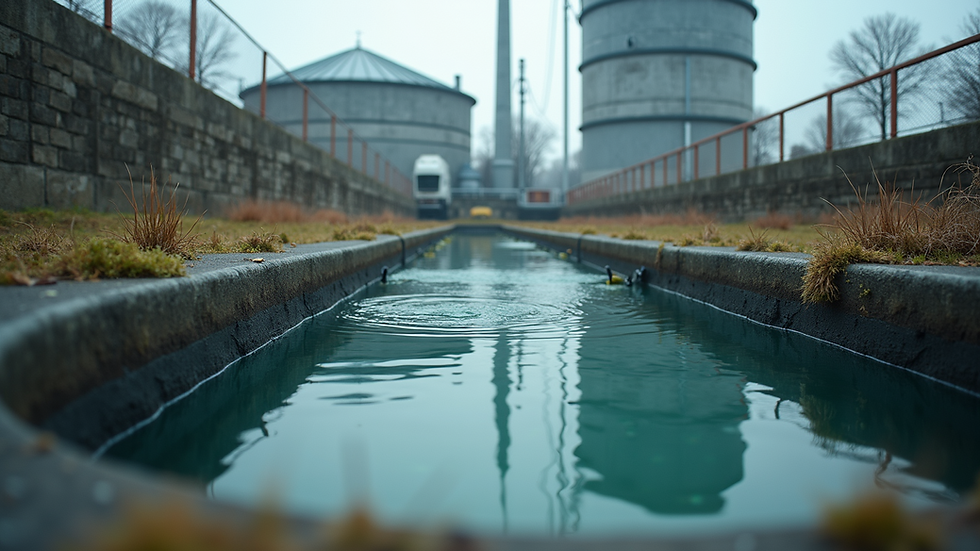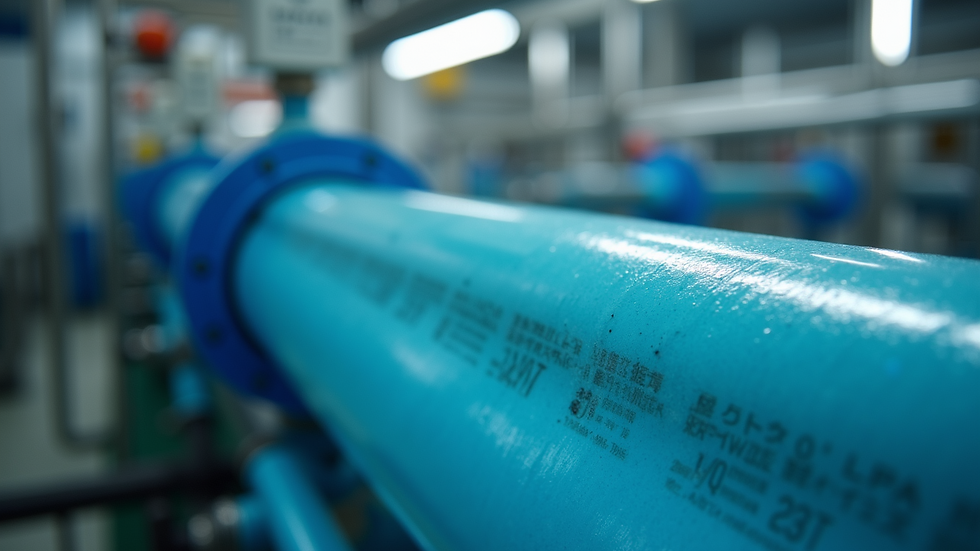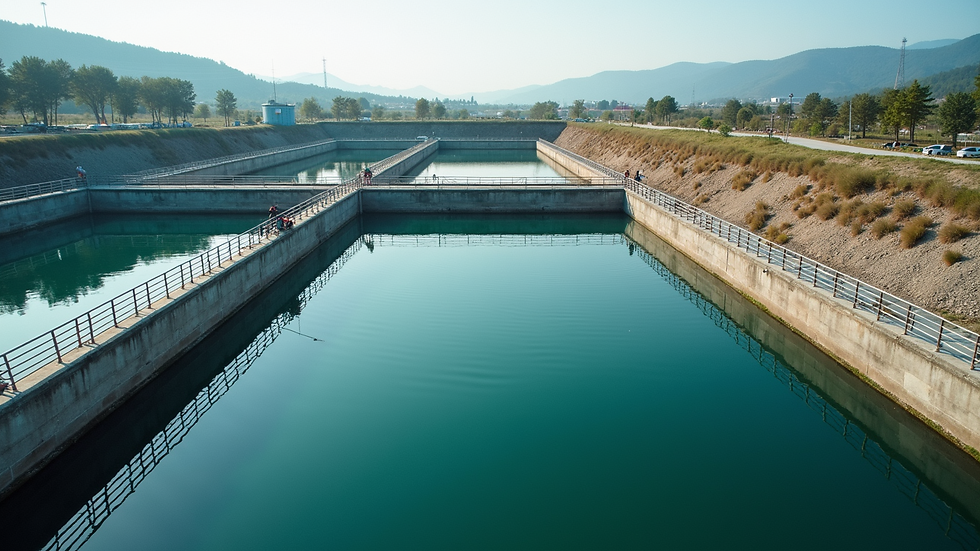Discover Effective Solutions for Industrial Wastewater
- palwinder kaur
- Aug 11, 2025
- 4 min read
Industrial wastewater is a significant environmental concern that requires effective treatment and management. Industries generate large volumes of wastewater containing various pollutants, which, if not treated properly, can harm ecosystems and public health. Implementing the right industrial water solutions is essential for sustainable operations and regulatory compliance. This article explores practical and innovative approaches to managing industrial wastewater, helping industries reduce their environmental footprint and optimize water reuse.
Understanding Industrial Water Solutions for Wastewater Treatment
Industrial water solutions encompass a range of technologies and practices designed to treat wastewater generated by manufacturing, processing, and other industrial activities. These solutions aim to remove contaminants such as heavy metals, organic compounds, suspended solids, and pathogens before releasing water back into the environment or reusing it within the facility.
Some common industrial water solutions include:
Physical treatment methods: Sedimentation, filtration, and flotation to remove suspended solids.
Chemical treatment methods: Coagulation, flocculation, and neutralization to precipitate or neutralize pollutants.
Biological treatment methods: Using microorganisms to degrade organic pollutants.
Advanced treatment technologies: Membrane filtration, reverse osmosis, and advanced oxidation processes for high-quality effluent.
For example, a textile factory may use a combination of coagulation and biological treatment to remove dyes and organic matter from its wastewater. Meanwhile, a metal plating plant might rely on chemical precipitation to remove heavy metals effectively.

Adopting these solutions not only helps industries comply with environmental regulations but also reduces water consumption by enabling water recycling and reuse. This approach supports sustainability goals and can lead to significant cost savings.
Key Industrial Water Solutions to Improve Wastewater Quality
Choosing the right industrial water solutions depends on the type of wastewater, pollutant load, and discharge requirements. Here are some effective solutions widely used across industries:
1. Sedimentation and Filtration
Sedimentation allows heavy particles to settle at the bottom of treatment tanks, while filtration removes smaller suspended solids. These methods are often the first step in wastewater treatment.
2. Chemical Treatment
Chemical additives like coagulants and flocculants help aggregate fine particles into larger clumps, making them easier to remove. Neutralization adjusts pH levels to safe ranges.
3. Biological Treatment
Activated sludge systems and biofilters use bacteria to break down organic pollutants. This method is cost-effective and environmentally friendly.
4. Membrane Technologies
Membrane filtration, including ultrafiltration and reverse osmosis, provides high-quality water by removing dissolved solids and microorganisms. These are ideal for industries requiring water reuse.
5. Sludge Management
Proper handling and disposal of sludge generated during treatment are crucial. Technologies like dewatering and anaerobic digestion reduce sludge volume and recover energy.
Implementing a combination of these solutions tailored to specific industrial needs ensures efficient wastewater treatment and resource recovery.

What are the 5 stages of wastewater treatment?
Wastewater treatment typically involves five key stages that progressively remove contaminants to produce clean effluent:
Preliminary Treatment
Removes large debris and grit through screening and sedimentation to protect downstream equipment.
Primary Treatment
Settles suspended solids by gravity in primary clarifiers, reducing organic load.
Secondary Treatment
Uses biological processes like activated sludge or biofilm reactors to degrade dissolved organic matter.
Tertiary Treatment
Advanced treatment to remove nutrients, pathogens, and fine particles using filtration, disinfection, or chemical methods.
Sludge Treatment and Disposal
Treats the residual sludge through thickening, digestion, and dewatering before safe disposal or reuse.
Each stage plays a vital role in ensuring the treated water meets environmental standards and can be safely discharged or reused.

Practical Tips for Implementing Industrial Wastewater Management
Effective industrial wastewater management requires a strategic approach combining technology, monitoring, and operational best practices. Here are actionable recommendations:
Conduct a thorough wastewater characterization to identify pollutants and their concentrations.
Select treatment technologies based on wastewater composition, volume, and discharge standards.
Implement real-time monitoring systems to track treatment performance and detect issues early.
Train staff regularly on operational procedures and safety protocols.
Optimize water reuse by integrating treated water into industrial processes such as cooling or cleaning.
Maintain equipment proactively to prevent breakdowns and ensure consistent treatment quality.
Collaborate with experts and service providers specializing in industrial wastewater management for customized solutions.
By following these tips, industries can enhance treatment efficiency, reduce environmental impact, and achieve cost savings.
Future Trends in Industrial Water Solutions
The field of industrial water solutions is evolving rapidly with innovations aimed at improving efficiency and sustainability. Some emerging trends include:
Digitalization and automation: Smart sensors and AI-driven analytics optimize treatment processes and reduce manual intervention.
Resource recovery: Technologies that extract valuable materials like metals and nutrients from wastewater are gaining traction.
Green chemistry: Using eco-friendly chemicals and processes minimizes secondary pollution.
Decentralized treatment systems: Compact, modular units enable on-site treatment and water reuse, reducing infrastructure costs.
Energy-efficient technologies: Low-energy membranes and biological processes help reduce the carbon footprint of wastewater treatment.
Adopting these trends will help industries stay ahead of regulations and contribute to a circular economy.
Industrial wastewater treatment is a critical component of sustainable industrial operations. By leveraging effective industrial water solutions, industries can protect the environment, comply with regulations, and optimize resource use. Whether through traditional methods or cutting-edge technologies, the key lies in selecting the right combination tailored to specific wastewater challenges. For comprehensive support and innovative solutions, partnering with experts in industrial wastewater management can make a significant difference in achieving long-term success.



Comments